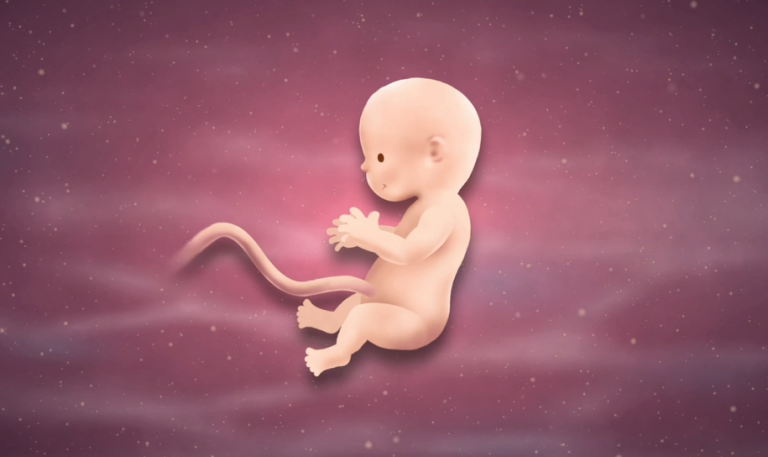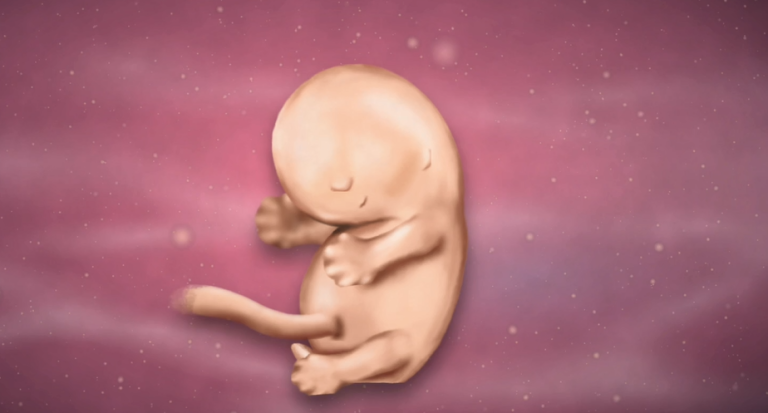Some of the most memorable weeks in your life, the first moments with your baby, have already passed. Although pregnancy seems very long at first, time flies by. As your baby develops and grows rapidly, your body also changes. In this article, you can find information about the changes you and your baby are going through.
Your Baby at Nine Weeks
In the ninth week, while your pregnancy symptoms continue at full strength, your baby’s development will pleasantly surprise you.
How Big is Your Baby at Nine Weeks?
Your baby, which was only the size of a tiny raspberry at your first ultrasound, has now grown to the size of a cherry. From now on, he will grow faster every day. You can find the average foetal length and weight in the table below. These values are averages and may vary from baby to baby due to differences in the moment of fertilisation, which cannot be exactly known. If it occurred later than expected, your baby’s values might be lower. Only your doctor can tell you whether there is cause for concern or not.
| Gestational Age | Weight Gestational Sac* | Length |
| 9th week | 3–3.5 g | 2−2.5 cm |
* Because the baby is very small, not the embryo’s weight but that of the gestational sac is calculated.
Development of the Organ Systems and Skills
In week nine, your baby continues to grow exponentially. Your baby is still called an embryo but will soon become a foetus. If you want to know what kind of changes he is going through and how his organs and systems develop, read on!
- The Nervous System
Your baby’s brain and spinal cord develop rapidly but are not advanced enough to transfer information between the organs and the brain. The control of the brain over other systems and organs is not fully in place.
- The Circulatory System
The heart continues to develop, and the valves, which allow the blood to circulate, also start to form in the ninth week. Until nine weeks, the yolk sac met the vital needs of your baby, including providing nutrition and the exchange of gasses. However, with the development of the bone marrow, spleen, and liver by the ninth week, your baby’s organs will take over these vital functions.
- The Digestive System
The structures and organs that make up the digestive system continue to develop. The baby’s intestines elongate, and the anus, which will serve to expel digestive waste from the body in the future, begins to form.
- The Respiratory System
The lungs had already begun to form. In the ninth week, the diaphragm, the major muscle of respiration, takes shape. The nose, the first organ of the respiratory system, can clearly be seen in profile on ultrasound, and the tip of the nose and nostrils develop further.
- The Musculoskeletal System
In the ninth week of pregnancy, the baby’s cartilaginous musculoskeletal system gradually turns into a bony structure. This process is called ossification, which first takes place in the skull. The arms and legs further develop, and the tiny fingers, with their unique fingerprints, lengthen. The fingers and toes are formed, but they are still fused. In addition, the roots of the teeth begin to form.
The nine-week-old embryo is now making tiny movements. Yet, it is unlikely that you will feel them. Hard as it is, you will need to show a little more patience before you can feel your baby move.
- The Urinary System
The kidneys have not formed yet, but the foundations of the urinary system, which will filter the blood and produce urine, are being laid.
- The Reproductive System
Although your only wish is that your baby will be healthy, once you find out you are pregnant, you may have wondered about its gender. But your baby needs more time. Even though the reproductive organs have begun to develop, the external genital organs are not visible yet.
- The Endocrine System
There are many hormones and glands in the human body. At nine weeks of pregnancy, the thyroid gland, which regulates the metabolic activities in the body, begins to develop at the base of the tongue and neck.
Your Baby’s Movements at Nine Weeks
Your baby continues to grow every day. His arms, legs, hands, and feet develop and lengthen. Even though your baby has started to move a little at this stage, he is not large enough for you to feel this. You will be excited once you start feeling your baby’s kicks and movements in your womb. But you have to wait a little longer for these wonderful moments.
A Nine-Week-Old Embryo’s Sense Organs
As the brain controls the sense organs, their development depends on that of the brain. Although they begin to form gradually, they cannot fulfil their duties yet. Therefore, it is too early to say that an embryo is a fully sentient being at nine weeks. Let’s take a look at the development of the different sense organs:
- The Eyes and the Sense of Sight
Your baby’s eyelids are completed, and his eyes begin to form inside these two grooves. He is not yet capable of seeing. At this moment, the eyes are located on the sides of the head. In the future, the structure of the face will develop, and the eyes will find their proper location. The eye muscles are not yet mature.
- The Ears and the Sense of Hearing
We know that you have secretly been talking to your baby ever since you learned you were pregnant. This certainly makes sense as a way to bond with your baby. But his hearing is not well-developed enough to hear you yet. At the moment, he has small earlobes where his ears will come.
- The Skin and the Sense of Touch
Your baby’s first sense to fully develop is probably the sense of touch because the skin is completed before any other organs. Your baby will gradually begin to feel the amniotic fluid surrounding him. In the future, he will even feel the pressure caused by your touch.
- The Tongue and the Sense of Taste
The oral cavity, where the tongue is located, gradually takes shape and becomes more prominent. At the moment, he cannot move his mouth yet or taste the liquid he is in. He will gain these skills in the coming weeks. Also, at nine weeks of pregnancy, the roots of the teeth begin to form.
- The Nose and the Sense of Smell
When looking at your baby’s profile, the nose is prominent enough to see on an ultrasound. However, the olfactory receptors that allow him to detect odours are not yet developed enough for your baby to smell anything.
How Many Months is Your baby at Nine Weeks?
Pregnancy normally lasts 40 weeks or nine months and ten days. This seems like a long time, but it passes very quickly. Most people calculate this period in months, but your doctor will speak about the number of weeks. This can be confusing at times. If you are wondering how nine weeks translates into months, you can calculate it as follows:
1 week = 7 days, 1 month = 30 days
9 weeks = 9 × 7 = 63
63/30 = 2 months 3 days
As you can see, two months have passed, and you have entered the third month.
Your Body at Nine Weeks of Pregnancy
Weeks have passed since you received the news that you will become a mother. As you reach the ninth week of pregnancy, your body changes further. Let’s examine what you can expect now.
- Weight Gain
Weight gain is one of the most noticeable changes in pregnancy. In the first weeks, your pregnancy is not obvious, but now you may gradually start to gain weight. Keeping this increase under control throughout pregnancy is very important for you and your baby. We recommend paying attention to your weight gain and discussing this with your doctor.
- Morning Sickness
One of the biggest challenges of early pregnancy is morning sickness. There are several reasons for this nausea. It starts with the increase of the hormone Beta HCG, the pregnancy hormone, and usually continues until about the thirteenth week. Other causes for this nausea are sudden drops in blood pressure and low blood sugar. This is why you may feel this more intensely when you wake up or on an empty stomach.
Another cause of nausea is the increase in progesterone. This relaxes the stomach muscles and slows the passage of food through the intestines. As a result, stomach acid increases, causing nausea. If you experience excessive vomiting, you should consult your doctor. You may have to take supplements for the water, salt and minerals you have lost.
- Increase in blood volume
With pregnancy, there is an almost 50% increase in your blood volume. This can cause your veins to become more prominent and also cause occasional nosebleeds. You needn’t worry about this. The increase in blood volume also protects against excessive blood loss during childbirth.
- The expansion of the uterus
One of the most obvious changes in the ninth week is that your uterus increases. It is about the size of an orange now but is still fully located behind your pubic bone. As your baby is still tiny, the main reason is the increased blood volume. In the first three months of pregnancy, 25% of the blood from your heart is pumped to the uterus and placenta, contributing to the growth of your baby and uterus.
- Frequent urination
As your uterus grows, the pressure on your bladder also increases. This may cause the urge to urinate more often.
- Pregnancy fatigue
Pregnancy is a period full of physical and emotional changes. Therefore, it is quite natural for you to feel tired. You may feel exhausted after short walks and even want to nap during the day. The main reason is that your body prepares for motherhood and the later stages of pregnancy. Rest whenever you can and try to avoid worries and anxiety.
- Changes in your breasts and skin pigmentation
Your body prepares itself for the postpartum period. This is noticeable in your breasts, which become larger, and your nipples darken. The reason for your nipples to darken is that the pregnancy hormones increase the pigments in your body. It also causes the formation of a dark line on your stomach, the linea nigra.
Tips to Minimise Troublesome Pregnancy Symptoms
The first and third trimesters of pregnancy are usually more challenging than the second. At nine weeks, you are still in the first trimester. Some symptoms can negatively influence your daily life, and you probably want to minimise them as much as possible.
- To avoid issues like indigestion, heartburn, nausea, and gas, it is better to eat smaller portions frequently. Your complaints may reduce when you do not fill your stomach too much.
- Regular exercise will do you good. It may help keep your weight gain in check and prevent or reduce back pain in the future. Regularly doing the right exercises may even make childbirth easier. In consultation with your doctor, you can choose a pregnancy-appropriate activity such as pregnancy yoga, pregnancy Pilates, swimming, or walking.
- If you experience an increase or darkening of vaginal discharge, or a bad smell, you should see your doctor.
How Much Weight Should You Gain?
Pregnancy is a miraculous period in which you give life to a new being within you. As your baby grows, your body prepares itself, and an increase in weight is normal. However, it is important to monitor your weight, as excess weight gain can cause gestational diabetes, high blood pressure and high cholesterol. In addition, being overweight can lead to certain complications in childbirth.
As weight gain will accelerate during the second trimester, keeping your weight under control during the first three months is useful. During the first trimester, the average pregnancy weight gain is between one and three kilograms.
Nutritional Recommendations at Nine Weeks of Pregnancy
Everything you eat during pregnancy is either transferred to your baby through the placenta or used up or stored by you. Thus, nutrition is incredibly important at nine weeks of pregnancy. The information below may help you to eat well.
- Avoid processed foods that contain additives and have a long shelf life. Do not consume processed meats such as salami, sausages, lunch meats, etc., and remove ready-made soups and acidic beverages from your diet.
- The need for calcium is quite high during this period. Therefore, make sure you consume adequate foods rich in calcium and protein, such as milk, cheese, yoghurt, and kefir.
- Avoid diets and detoxes. If you eat a balanced diet full of nutritious foods, there is no need to eat less. Also, make sure to eat foods from the different food groups daily. So, if you ate only vegetables for lunch, you need to consume some meat in the evening. You can also add highly nutritional snacks to your daily eating routine, such as fruit, walnuts, and hazelnuts.
Exercise Recommendations at Nine Months
Sports and exercise remain very important during pregnancy to keep your weight gain under control and prevent body aches and back pain from carrying your baby. Having a strong musculoskeletal system may also help during childbirth. Talk to your doctor and sports coach and choose the most appropriate activity for you. Ideal activities at nine weeks of pregnancy are pregnancy yoga, pregnancy Pilates, walking and swimming.
Nine Weeks Pregnancy Checklist
- Prenatal care is very important. When you are pregnant, you will have regular doctor’s check-ups and tests. During the first trimester, this will be approximately every four weeks. If you have a nine-week check-up planned, this will probably mainly consist of an ultrasound scan, some information exchange with your physician, and lab tests.
- At nine weeks, you can make your own checklist, listing what is important for you. For example, plan some self-care, buy some cream or oil to prevent stretch marks, and choose a moisturiser for your nipples.







